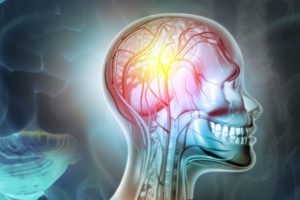You probably already know that brushing and flossing your teeth every day keeps them in tip-top shape, but did you know it could also contribute to a healthier brain? Recent scientific studies linked oral issues to

other concerning health risks with some serious consequences. That means by keeping up with
dental appointments, you can lower your chances of developing them. Keep reading to learn two conditions impacted by your dental hygiene and what you can do to protect yourself!
Condition #1: Alzheimer’s
In the summer of 2023, a study was published in an online issue of the medical journal of the American Academy of Neurology. It found evidence that gum disease and tooth loss are associated with memory and Alzheimer’s disease.
At the start of the experiment, individuals were given memory tests and had dental exams that included counting their teeth and measuring their gum depth. They also had brain scans to measure the size of their hippocampus, which is the part of the brain that is associated with memories and learning. Alzheimer’s is known to destroy neurons in this area which contributes to patients’ symptoms.
What researchers found is that individuals with fewer teeth and higher rates of gum disease showed a faster rate of brain shrinkage in this important memory center. The increase in the rate of brain shrinkage due to one less tooth was equivalent to almost one year of brain aging. It was worse for those with advanced gum disease, who reflected 1.3 years of brain aging under the same circumstance.
Condition #2: Stroke
Those with dental issues are unfortunately also at an increased risk of high blood pressure and stroke. This health scare is listed by the American Stroke Association as the number 5 cause of death and the first leading cause of disability in the United States. That means it’s a serious issue that you might be able to prevent!
A study took place between 2014 and 2021 in which 40,000 adults without a history of stroke were screened for over 100 genetic components tied to oral issues, like cavities and missing teeth. Their brain health was also evaluated and recorded via MRI images which measured unhealthy white matter.
The results showed that people who were more genetically prone to tooth decay and tooth loss represented a 24% increase in the amount of white matter in the scans. They also found that it increased damage to the microstructure of the brain by 43%.
How Can I Lower My Risk?
Though it’s not a guarantee that you’ll never develop certain conditions, keeping up with your dental hygiene can help lower the likelihood. The best way to keep your mouth in good shape is to implement a regular oral care routine that includes brushing and flossing twice daily. This removes plaque buildup and toxic bacteria known to cause disease.
Also, it’s important to schedule a dental checkup once every 6 months. That way, your dentist is sure to catch any areas of concern so that you know your teeth, and brain, can stay strong and happy for the long haul!
About the Practice
Our experienced dental team at Michelsen Dental truly cares about their patient’s health above and beyond their teeth and gums. We’re equipped to provide a wide range of dental services in-office to minimize outside referrals. We use the most advanced technology so that you know you’re getting the best possible results. If you need to schedule a checkup, you’re welcome to request an appointment on our
website or by calling (714) 492-1169.
 other concerning health risks with some serious consequences. That means by keeping up with dental appointments, you can lower your chances of developing them. Keep reading to learn two conditions impacted by your dental hygiene and what you can do to protect yourself!
other concerning health risks with some serious consequences. That means by keeping up with dental appointments, you can lower your chances of developing them. Keep reading to learn two conditions impacted by your dental hygiene and what you can do to protect yourself!
 other concerning health risks with some serious consequences. That means by keeping up with dental appointments, you can lower your chances of developing them. Keep reading to learn two conditions impacted by your dental hygiene and what you can do to protect yourself!
other concerning health risks with some serious consequences. That means by keeping up with dental appointments, you can lower your chances of developing them. Keep reading to learn two conditions impacted by your dental hygiene and what you can do to protect yourself!
 other concerning health risks with some serious consequences. That means by keeping up with dental appointments, you can lower your chances of developing them. Keep reading to learn two conditions impacted by your dental hygiene and what you can do to protect yourself!
other concerning health risks with some serious consequences. That means by keeping up with dental appointments, you can lower your chances of developing them. Keep reading to learn two conditions impacted by your dental hygiene and what you can do to protect yourself!
 Request
Request